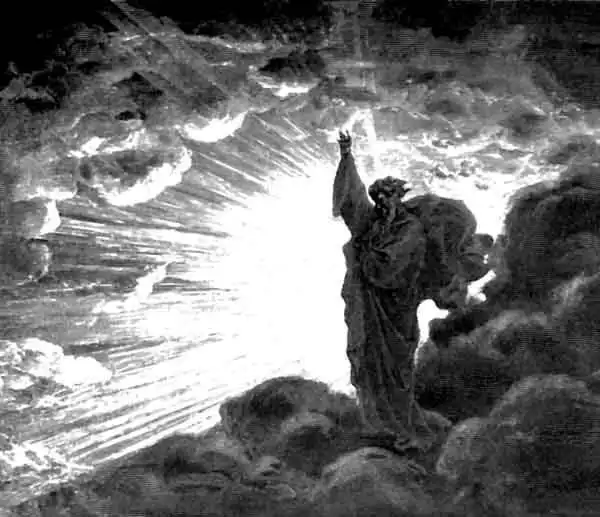The Creation in the Bible: Good for Man
Genesis 1 Creation Examined, part 3
3 Good for manThe barren form of the story, its oral ingredients, and the strict order of creation, all hint at this being a very old tradition, so far back that at the time it was written down only the very basic fragments of it remained. The very rude and straightforward cosmology of it might have been a generally familiar understanding among a people, as to how the world began, written down in the comprised style that was adequate to people's awareness of it.
God is vague to the point of being void of personality. He does not even have a name. Instead, he is mentioned as a plural, as if referring to divinity in general. He is distant and detached, acting rather mechanically when creating one thing after the other. He does conclude about every part of his creation that it is good, tob, which is a very general term, like fine or nice. For describing the very creation of the world and its inhabitants, it seems like an understatement, especially since he makes no mention of what or whom it is good for. It cannot be for him, since he has no obvious use for it, nor a specified reason for doing it. There can only be one for whom it is good, and that is man. This is evident on the sixth day, when God hands the whole world over to man, like a gift, which man is free to use solely for his own benefit. Such a creator god is more of a servant than a ruler, and he seems to imply that by this deed his work is done for good. Henceforth, man is on his own. A distant creator god of this kind is quite common in myths around the world. The one who made the world is often regarded as so distant that he is unlikely to have anything to do with the world as it is since. He may even be reluctant to get involved, displeased or estranged with it all. Genesis 1 indicates such a god, who made the world and then left it, and therefore is just about unknown to it. A mysterious entity in the most distant past, the dawn of time, who somehow got the world in motion, and had no other role. A primordial creature, stuck in primeval time. It is quite significant that what he does when he has completed his creation is to rest. His work is done.
Elohim and JahveThis god differs tremendously from the one in Genesis 2, who has a name and a distinct personality, who is passionately involved in creation and all the events of it, doing it all in dialogue with man, like a father to a son.It is generally assumed, even accepted as a fact, that Genesis 1 is of a much later date than Genesis 2. That may be true for the written versions of them, but it is not at all as certain for the origins of the two creation stories. The lack of character and features of Elohim in Genesis 1 suggests that this is an earlier version of the Hebrew god than Jahve in Genesis 2, whom his people are quite familiar with and have close at hand. Also, the summary form of creation in Genesis 1 seems more distant in time and familiarity, than the explicit and detailed drama of Genesis 2. The writer of Genesis 2 must have been more close to and comfortable with the story told there, than what the writer of Genesis 1 was with that version. Even if the writer of Genesis 1 was also the inventor of the story, the anomalies remain. Would not an author add some detail and drama, especially since the story of Genesis 2 would have been familiar to him at the time when that writing is most likely to have taken place? Also, he would most likely have tried to write a story that did not conflict so strikingly to Genesis 2 as Genesis 1 does in several ways. It is much more likely that the two creation stories stem from two separate traditions of old, written down separately, and brought together by others than any of the original writers. The fact that Genesis 1 is generally regarded as more recent than Genesis 2 might be from conclusions based on the idea that the more abstract a cosmogony is, the less of a dramatic story, the more advanced and recent it is. This assumption might fit our present day understanding of cosmology the best, but it is far from the rule when applied to creation myths through history. Actually, the cosmology of a creation myth is of little help in dating it. The cosmos has not changed much through the human era, and our understanding of it was rather constant until the past few centuries. Although I am inclined to regard the myth of Genesis 1 as of older origin than that of Genesis 2, I cannot say that with any certainty. But they must stem from separate mythological traditions and beliefs. Elohim and Jahve differ too much, as do their creation stories, for them to be mere variants of one and the same tradition. Elohim is a very distant high god similar to the Zoroastrian god Ahura Mazda, for example, whereas Jahve with his very human-like features and behavior comes closer to such gods as Zeus of the Greeks. Also, with Elohim there is room for the possibility of more gods than one, but Jahve is unquestionably alone, finding only creatures of his own creation to keep him company.
If the two gods do not originate in different mythological traditions, then it is much more likely that Jahve is a later revision of Elohim, than the other way around. It is possible, although not that likely, for the distant Elohim by time to become a personalized divinity, increasingly close and familiar to his worshipers. But there is no way that Jahve would dissolve into that strange nameless entity.
4 CommentariesGenesis 1 CreationThe first creation of the Bible
This article was originally written for a seminar at the Department of History of Ideas and Learning, Lund University, as a part of my dissertation in progress on creation myths and their patterns of thought. Transforming the text to webpages, I have excluded footnotes, or edited them into the text.
MENUCreation Myths Around the WorldHow stories of the beginning began.
The Meanings of MythologyTheories through history about myth and fable.
Archetypes in MythsThe mythological symbols and what they stand for.
The Logics of MythPatterns of creation.
ContactAbout Cookies
CREATION MYTHS IN DEPTHCreation in Rig Veda 10:129The paradox of origin, according to an Indian myth.
Genesis 1The first creation story of the bible scrutinized.
Enuma ElishThe ancient Babylonian creation myth.
Xingu Creation of ManThe insoluble solitude of gods and humans.
ON MY OTHER WEBSITESPsychoanalysis of MythWhat Sigmund Freud and C. G. Jung thought about myths, their origins and meanings.
Myth of CreationAn introduction to the subject of creation myths and the patterns of thought they reveal.
Cosmos of the AncientsWhat the Greek philosophers believed about the cosmos, their religion and their gods.
Life EnergyThe many ancient and modern life force beliefs all over the world explained and compared.
TaoisticTaoism, the ancient Chinese philosophy of life explained. Also, the complete classic text Tao Te Ching online.
|
 Archetypes of Mythology
Archetypes of Mythology Psychoanalysis of Mythology
Psychoanalysis of Mythology Cosmos of the Ancients
Cosmos of the Ancients Life Energy Encyclopedia
Life Energy Encyclopedia Sunday Brunch with the World Maker
Sunday Brunch with the World Maker Fake Lao Tzu Quotes
Fake Lao Tzu Quotes Stefan Stenudd
Stefan Stenudd